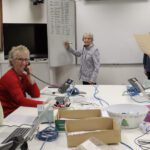C250/08
10 September 2008
In a first for Western Australia, Curtin University of Technology’s regional students will have 24 hour access to tutors, in a trial across the University’s 10 regional centres, from this week.
The program, known as SMARTTHINKING, guarantees each student personalised support from a real tutor, available any time from any computer connected to the internet.
Curtin’s Head of Regional, Remote and E-Learning Associate Professor Christopher Brook said the program would provide valuable additional tutoring support to students in remote regions.
“Early reports from other trials suggest that the program results in students achieving improved grades, developing increased confidence in their academic ability and an increase in unit completion rates,” Associate Professor Brook said.
The SMARTTHINKING tutoring program will join a suite of Web 2.0 tools that are being used at Curtin’s regional centres, designed to take advantage of contemporary technologies to support students who are geographically removed from resources available in major cities.
“Technologies like Blogs, Wikis and VOIP (voice over internet protocols) are just some of the tools that have become central to the delivery of an outstanding teaching and learning experience in our regional centres,” Associate Professor Brook said.
“Thanks to these technologies, country students are no longer at a disadvantage to their city counterparts.”
As part of the trial, Curtin’s regional students will be able to ask their SMARTTHINKING tutors for assistance in understanding assignment topics, in how to construct an answer and in academic writing and referencing techniques.
“SMARTHINKING tutoring will never replace face-to-face tuition and it is not intended to, but it does provide an immediate, convenient and effective way to access that little bit extra support that is sometimes needed,” Associate Professor Brook said.
Modified: 10 September 2008


